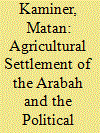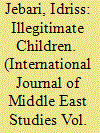|
|
|
Sort Order |
|
|
|
Items / Page
|
|
|
|
|
|
|
| Srl | Item |
| 1 |
ID:
184209


|
|
|
|
|
| Summary/Abstract |
Agricultural settlement geared to capitalist commodity production and accompanied by massive ecological interventions has historically been central to the Zionist colonial project of creating a permanent Jewish presence in the “Land of Israel.” The hyperarid southern region known as the Central Arabah is an instructive edge-case: in the 1960s, after the expulsion of the bedouin population, cooperative settlements were established here and vegetables produced through “Hebrew self-labor,” with generous assistance from the state. In the 1990s the region was again transformed as the importation of migrant workers from Thailand enabled farmers to expand cultivation of bell peppers for global markets. But today ecological destruction, depletion of water resources, and global warming cast doubt over the viability of settlement in this climatically extreme region. I locate the settlements of the Arabah within the historical political ecology of the Zionist movement, arguing that their current fragility exposes the essential precarity of capitalist colonization.
|
|
|
|
|
|
|
|
|
|
|
|
|
|
|
|
| 2 |
ID:
184210


|
|
|
|
|
| Summary/Abstract |
The 17th century was a period of transition in world history. It was marked globally by social movements emerging in response to widespread drought, famine, disease, warfare, and dislocation linked to climate change. Historians have yet to situate Safavid Iran (1501–1722) within the “General Crisis.” This article, coauthored by an environmental historian and a climate scientist, revisits primary sources and incorporates tree-ring evidence to argue that an ecological crisis beginning in the late 17th century contributed to the collapse of the imperial ecology of the Safavid Empire. A declining resource base and demographic decline conditioned the unraveling of imperial networks and the empire's eventual fall to a small band of Afghan raiders in 1722. Ultimately, this article makes a case for the connectedness of Iran to broader global environmental trends in this period, with local circumstances and human agency shaping a period of acute environmental crisis in Iran.
|
|
|
|
|
|
|
|
|
|
|
|
|
|
|
|
| 3 |
ID:
184211


|
|
|
|
|
| Summary/Abstract |
In the 1960s and 1970s, Iranian officials embraced natural gas as a new energy source for their rapidly industrializing society, seeing it as a readily available substitute for the lucrative oil products their country's citizens were consuming in increasing amounts. Reacting to the growing concentrations of smoke and haze in cities, and unable to alter the mountainous terrain and semiarid climate that intensified them, gas seemingly promised to be a technical savior upon which to build an Iran as environmentally sound as it was prosperous, technologically sophisticated, and energy hungry. Pahlavi-era developmental choices were shaped by officials’ concern for deteriorating environmental conditions, the natural factors that compounded the issue, and the interests of private industry. Using archival and published materials collected in Iran, this article focuses on urban air pollution and the fitful efforts to mitigate it through the conversion of industrial facilities to gas.
|
|
|
|
|
|
|
|
|
|
|
|
|
|
|
|
| 4 |
ID:
184212


|
|
|
|
|
| Summary/Abstract |
The alliance between the leftist movement Perspectives Tunisiennes and university students delivered sustained opposition and repeated protests against Bourguiba's regime in the 1960s and 1970s. This article argues that these groups were driven by the “student question,” a counterproject for Tunisian national development that opposed the vision of liberal bourgeois modernity espoused by Bourguiba's reforms of elitism through education and depoliticization. Instead, the student question was fleshed out in the group's periodical, envisaging the emancipation of Tunisian subjects and their entitlement to citizenship and political participation, and how the struggle of students would sweep the whole country. Drawing on the movement's journal and memoirs of four former Tunisian leftists, I trace how Perspectives navigated the regime's repression in 1968 and 1972–75, and how two successive generations of leftists emerged with different ideological reference points. In so doing, this article takes seriously the political imagination of this group during the global 1960s and 1970s, while conceiving ways to reintegrate silenced memories and histories into the mainstream of Tunisian historiography after the 2011 revolution.
|
|
|
|
|
|
|
|
|
|
|
|
|
|
|
|
| 5 |
ID:
184207


|
|
|
|
|
| Summary/Abstract |
In 1975, the world-famous novelist Yaşar Kemal (1923–2015) undertook a series of journalistic interviews with street children in Istanbul. The series, entitled “Children Are Human” (Çocuklar İnsandır), reflects the author's rebellious attitude as well as the revolutionary spirit of hope in the 1970s in Turkey. Kemal's ethnographic fieldwork with street children criticized the demotion of children to a less-than-human status when present among adults. He approached children's rights from a human rights angle, stressing the humanity of children and that children's rights are human rights. The methodological contribution of this research to the history of children and youth is its engagement with ethnography as historical source. His research provided children the opportunity to express their political subjectivities and their understanding of the major political questions of the time, specifically those of social justice, (in)equality, poverty, and ethnic violence encountered in their everyday interactions with politics in the country. Yaşar Kemal's fieldwork notes and transcribed interviews also bring to light immense injustices within an intersectional framework of age, class, ethnicity, and gender. The author emphasizes that children's political agency and their political protest is deeply rooted in their subordination and misery, but also in their dreams and hopes. Situating Yaşar Kemal's “Children Are Human” in the context of the 1970s in Turkey, I hope to contribute to childhood studies with regard to the political agency of children as well as to the history of public intellectuals and newspapers in Turkey and to progressive representations of urban marginalization.
|
|
|
|
|
|
|
|
|
|
|
|
|
|
|
|
| 6 |
ID:
184208


|
|
|
|
|
| Summary/Abstract |
Student unrest under Italian rule in Rhodes reveals youth's contribution to the transformation of Mediterranean politics in the 20th century. A condition of possibility for this unrest was the precolonial infrastructure of Rhodes, where new schools emerged in the last decades of Ottoman rule. During the Italian military occupation (1912–23), schools reflected identifications such as Ottoman patriotism and Greek irredentism. Student activism expanded beyond school issues and intersected with Italy's uncertain attitude concerning Rhodes's future, the warfare ravaging the Eastern Mediterranean, and the unmaking of Ottoman authority. Italian governors considered youth politicization to be influenced by elder politicians and limited to communal factionalism. After a decade of reforms under Italian sovereignty following the Treaty of Lausanne (1923), unrest reappeared in the 1930s. Students sympathized with ideas like pro-fascist Zionism and anticolonial Greek nationalism. They addressed issues of loyalty and belonging linked to Italian rule's dilemmas of fascist assimilation and colonial separation. Contrary to the 1910s, the authorities repressed student unrest and admitted that youth politicization was autonomous from the influence of the elders, conflicting with the fascist colonial order. Discussing student activism during this imperial transformation goes beyond narratives centered on state policies or one exclusive confessional group, highlighting interconnections between communal affairs, colonial governance, and regional geopolitics.
|
|
|
|
|
|
|
|
|
|
|
|
|
|
|
|
|
|
|
|
|